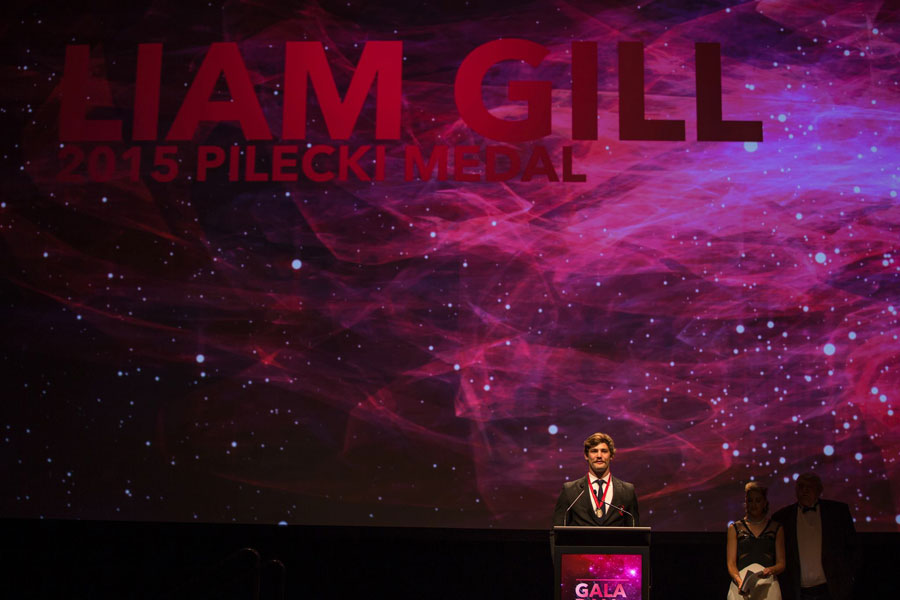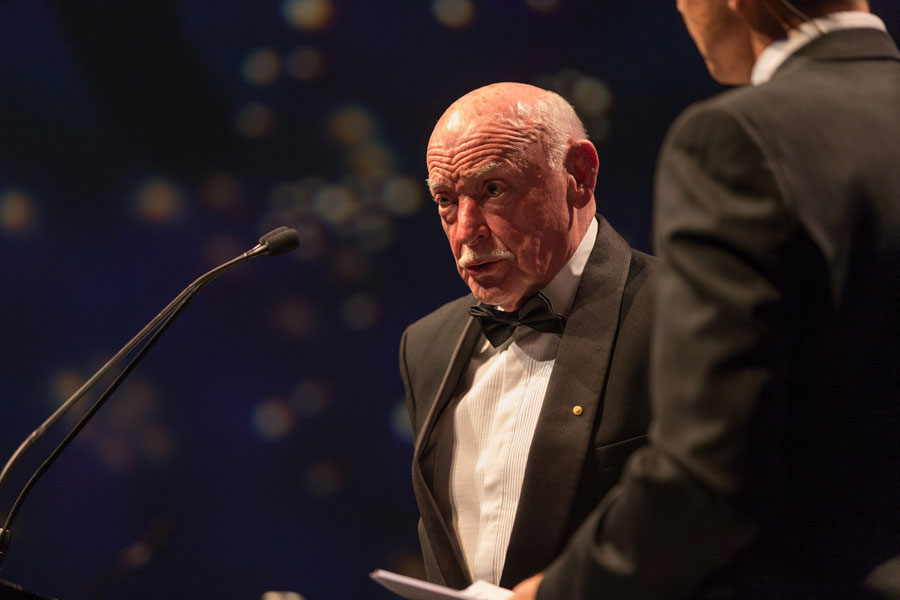|
The Growden Report
Australian rugby needs a strong Queensland
Greg Growden
August 3, 2015

Liam Gill was named Queensland Reds' Players' Player of the Year © Queensland Reds / Facebook
Enlarge
Queensland Reds are an on-field train wreck. But away from the playing arena, in true BrisVegas style, they certainly know how to throw a party. On Friday night, they held their annual Reds Ball - and for spectacle and surprise it would rank as one of the most memorable of rugby nights. The Reds may presently be Super Rugby paupers, suffering a dreadful season in which they finished 13th with only four wins, prompting calls that their coach Richard Graham should be moved on, but the Queensland Rugby Union spared no expense via the Ball in pushing all that is good about their province. The graphics were state of the art, using the same format as the Eurovision Song Contest. I kid you not. With master of ceremonies Nick McArdle expertly weaving it all together, Liam Gill got a mite emotional when he was announced as the Stan Pilecki Medal winner as Reds Players' Player of the Year. James Horwill quivered when he was farewelled from the Reds, explaining in his speech the delight he had in playing for Queensland with another departing player - Will Genia; he explained his long relationship with Genia, going back to schooldays when he called the half-back and team water boy 'Pooh Bear.' New recruit Kane Douglas was introduced, and Graham, even if his days appeared to be numbered at the Reds, rallied the crowd with a "we're on our way back" booster speech. Then there was the induction of three new members to the Queensland Hall of Fame: Alec Evans, Jason Little and Tom 'Rusty' Richards.

Greg Growden met legendary Reds doctor Abhi Varshney at the ball
© Greg Growden / Facebook
Enlarge
I was at the ball representing the Richards family, and the function organisers' handling of his induction will remain long in my memory; even a day or so after the event, the body tingles just thinking about it. Richards was the last to be inducted. Evans had finished his speech when suddenly there was a loud call from the back of the room. The doors opened and piper Captain Roddy MacDonald led in the marching Drum Corp of the 1st Regiment Royal Australian Artillery and the band of the 2nd/14th Light Horse Regiment QMI. As I made a short speech about Rusty, on the large screens around the room were shown pictures of the great man, the photographs he took of the landing at Gallipoli, shots of him playing rugby on the Western Front during World War I, and pictures of him proudly wearing the team blazer of the original Wallabies - the side that toured the United Kingdom in 1908-1909. After I left the stage, the audience was asked to stand as bugler Sergeant Paul McBurney played The Last Post, as see in the tremendous Reds Ball video below.
As memorable was Evans' speech. Alec Evans is one of the real unsung heroes of Australian Rugby. Apart from being a renowned hard man during his many years in the Queensland pack, he was also a formidable coach who was instrumental in Australia's success in the mid 1980s - including the 1984 Grand Slam and 1986 Bledisloe Cup triumph in New Zealand; he was the man who basically moulded the Wallabies pack into the best in the world. Alan Jones was the master motivator, but Evans was prepared to do the grinding work and happy to stay out of the limelight. Countless players credit Evans for their success, while Jones, in his recent interview with ESPN, was glowing in his praise of his loyal assistant. Since his Wallabies days, Evans has had stints coaching in the Sydney grade ranks, he was in charge of Wales for a short period, and he has helped Queensland on numerous occasions. And Wallabies coach Michael Cheika mentioned when he was in ESPN's Sydney offices last week that he was delighted that Evans had recently been in contact, providing support and advice. But Evans remains the most loyal Queenslander, and that came through when he talked during his speech about the tough teams he had played in - and what motivated him. That motivation included a deep dread of Queensland's most vehement opponent, New South Wales; and he certainly hasn't forgotten when NSW snubbed Queensland.

Alec Evans was inducted into the Queensland Hall of Fame © Queensland Reds / Facebook
Enlarge
One of the great debating points of Australian rugby is whether, in 1962, NSW opted against playing Queensland because they thought their northern neighbours were too weak. NSW officials have argued this is all poppycock, saying the absence of a fixture was due to an overloaded Wallabies trial schedule that year. But, from that day, Queensland have used it as a rallying cry and a succession of Reds coaches have used the "snub" as a rev-up line. A few years ago, when the Australian Rugby Union questioned the 1962 tale, explaining it was nothing more than "a colourful marketing tool," the 1962 Queensland manager Barrie French fired back: "Mao Tse-tung seems to have joined the ARU to rewrite history. No matter how many assertions emanate from NSW, the fact remains that the arrogant attitude of NSW in the 1960s and '70s aroused a lot of ire in Queensland, it could be one of the many reasons why we have moved so far ahead in playing standards, administration and solvency." The rivalry between NSW and Queensland, which was once at the core of Australian rugby, has petered out a bit. The Waratahs-Brumbies encounter is nowadays a more bitter battle - prompted by the Brumbies being formed by those who were regarded as NSW outcasts. But the night reminded all how important it is for Queensland to get their act together again. The Reds are easily the proudest of the five Australian provinces, and they have constantly excelled due to their deep belief in everything Queensland - producing a steady stream of the hardest, most talented and committed of Wallabies. The QRU, after some recent brain-dead moves, need only make some smart decisions and get rid of the deadwood as well as the incompetent to ensure the Reds are potent again where it really counts: on the field. When that happens, the overall health of Australian rugby will improve dramatically.
© ESPN Sports Media Ltd
|
Live Sports
Communication error please reload the page.
-
Football
-
Cricket
-
Rugby
-
- Days
- Hrs
- Mins
- Secs
F1 - Abu Dhabi GP
Abu Dhabi Grand Prix December 11-131. Max Verstappen ()
2. Valtteri Bottas (Mercedes)
3. Lewis Hamilton (Mercedes)
4. Alexander Albon ()
5. Lando Norris ()
6. Carlos Sainz Jr ()
-
ESPNOtherLive >>
Golf - Houston Open
Snooker - China Open
Tennis - Miami Open

